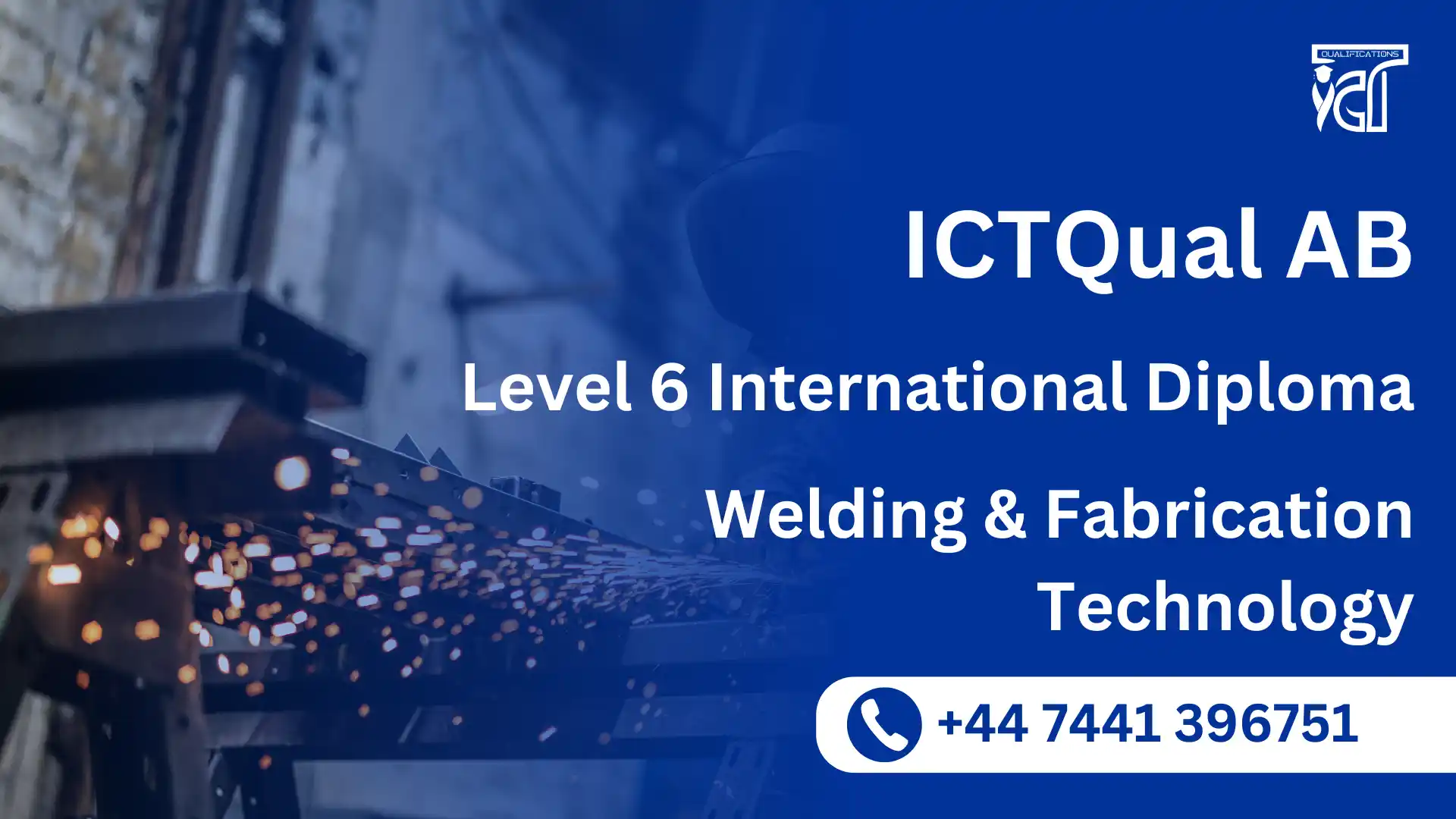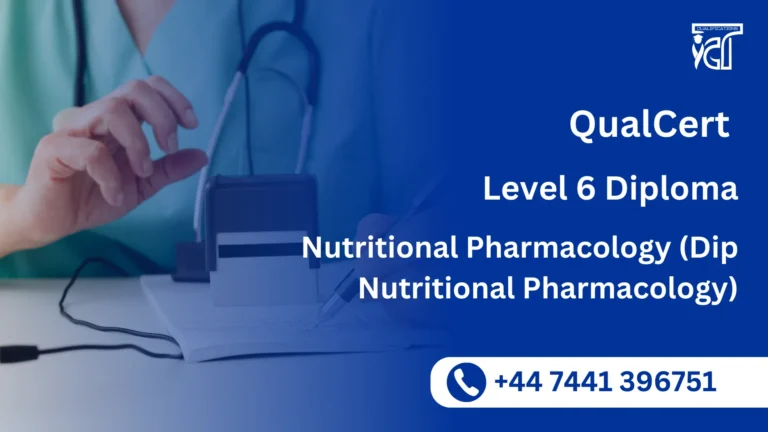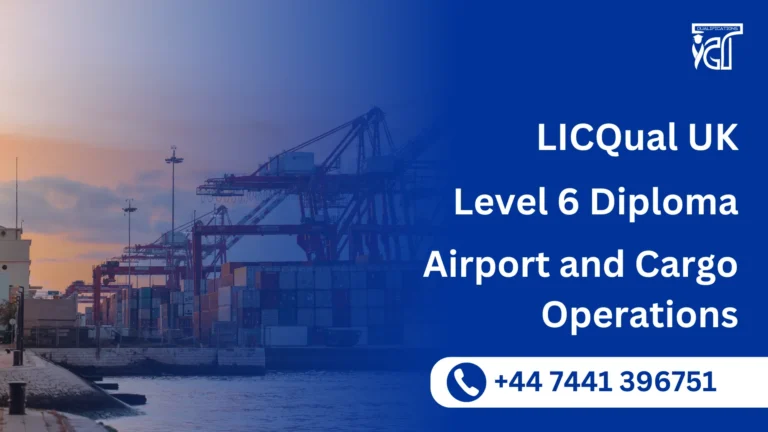The ICTQual AB Level 6 International Diploma in Welding & Fabrication Technology is an advanced, industry-focused programme designed to provide learners with expert knowledge and practical skills in one of the most critical areas of modern engineering. Delivered over three years and structured around 360 credits, this diploma combines theoretical understanding with hands-on training to meet global standards in welding and fabrication.
This qualification is ideal for both fresh learners aiming to enter the industry and experienced professionals looking to progress into supervisory or managerial roles. The course covers a wide range of specialist areas, including advanced welding techniques, structural fabrication processes, quality assurance, and workplace safety. By engaging with real-world applications, learners gain the confidence and technical expertise needed to excel in diverse industrial sectors such as construction, oil and gas, automotive, aerospace, and heavy engineering.
Completing this diploma equips learners with the skills to manage complex fabrication projects, lead skilled teams, and deliver innovative solutions to industry challenges. Its balanced approach to theory and practice ensures graduates are well-prepared for the demands of a competitive global market.
Key benefits of this programme include gaining internationally recognised welding and fabrication expertise, improving career prospects across multiple industries, and developing practical knowledge alongside strategic insight. Learners also build a competitive profile for global employment opportunities and establish a strong foundation for further study or leadership certifications in related disciplines.
This comprehensive diploma empowers learners to achieve long-term career growth while contributing to the success and innovation of industries worldwide. Its future-focused approach makes it an exceptional choice for anyone aspiring to build or advance a rewarding career in welding and fabrication technology.
ICTQual AB Level 6 International Diploma in Welding & Fabrication Technology
This qualification, the ICTQual AB Level 6 International Diploma in Welding & Fabrication Technology, consists of 36 mandatory units.
Year 1 – Foundation in Welding & Fabrication
- Introduction to Welding and Fabrication Technology
- Engineering Materials and Metallurgy
- Workshop Safety and Health Practices
- Basic Welding Techniques and Processes
- Metal Cutting and Shaping Methods
- Technical Drawing and Blueprint Interpretation
- Measurement and Quality Control in Fabrication
- Introduction to Welding Equipment and Tools
- Welding Metallurgy and Defects
- Fundamentals of Fabrication Design
- Industrial Mathematics for Fabrication
- Communication and Professional Skills
Year 2 – Intermediate Welding & Fabrication
- Advanced Welding Processes
- Gas Welding and Cutting Techniques
- Arc Welding and TIG/MIG Methods
- Welding Inspection and Testing
- Structural Fabrication Principles
- Sheet Metal Fabrication Techniques
- Welding Codes, Standards, and Regulations
- Welding Project Planning and Management
- Welding Metallurgy – Advanced Concepts
- Fabrication Automation and Machinery
- Health, Safety, and Risk Management in Welding
- Problem-Solving and Technical Decision Making
Year 3 – Advanced Welding & Fabrication
- Fabrication Design and Project Execution
- Advanced Structural Welding Techniques
- Pipe and Pressure Vessel Welding
- Welding Metallurgy – Failure Analysis
- Robotic Welding and Automation Technology
- Quality Assurance and Industry Standards
- Welding Project Management and Leadership
- Advanced Fabrication for Construction and Industry
- Cost Estimation and Resource Planning
- Research and Innovation in Welding Technology
- Capstone Project in Welding & Fabrication
- Professional Development and Career Planning
Learning Outcomes for the ICTQual AB Level 6 International Diploma in Welding & Fabrication Technology:
Year 1 – Foundation in Welding & Fabrication
Introduction to Welding and Fabrication Technology
- Understand the principles and scope of welding and fabrication.
- Recognise different welding techniques and their applications.
- Identify industry sectors using welding and fabrication processes.
- Understand safety and environmental considerations in welding operations.
Engineering Materials and Metallurgy
- Identify and classify metals, alloys, and non-metallic materials.
- Understand material properties such as strength, ductility, and hardness.
- Apply metallurgical principles to select suitable materials for fabrication.
- Analyse the effects of heat and welding on material properties.
Workshop Safety and Health Practices
- Implement safe practices in welding workshops.
- Identify potential hazards and apply risk control measures.
- Use personal protective equipment (PPE) correctly.
- Comply with health and safety legislation and regulations.
Basic Welding Techniques and Processes
- Perform fundamental welding processes safely.
- Understand joint types and welding positions.
- Demonstrate correct handling of welding equipment.
- Recognise and prevent common welding defects.
Metal Cutting and Shaping Methods
- Apply appropriate cutting techniques for different metals.
- Use shaping and forming tools accurately.
- Demonstrate control over hand and power tools.
- Understand tolerances and precision requirements.
Technical Drawing and Blueprint Interpretation
- Read and interpret technical drawings and schematics.
- Produce simple fabrication sketches and plans.
- Apply standard symbols and conventions in drawings.
- Use drawings to plan welding and fabrication tasks.
Measurement and Quality Control in Fabrication
- Perform accurate measurements using industry tools.
- Apply quality control standards to fabricated components.
- Identify errors and implement corrective measures.
- Maintain records of inspection and testing results.
Introduction to Welding Equipment and Tools
- Identify common welding tools and machinery.
- Operate equipment safely and efficiently.
- Conduct routine maintenance and inspections.
- Understand operational limitations of different tools.
Welding Metallurgy and Defects
- Recognise common welding defects and their causes.
- Analyse microstructural changes in welded materials.
- Implement corrective and preventive actions.
- Understand the impact of welding parameters on material properties.
Fundamentals of Fabrication Design
- Apply basic design principles to fabrication projects.
- Develop simple fabrication plans and layouts.
- Consider material selection and joint design in planning.
- Integrate design thinking with practical execution.
Industrial Mathematics for Fabrication
- Apply mathematical calculations to fabrication processes.
- Solve problems related to measurements, tolerances, and material quantities.
- Use formulas for structural and mechanical calculations.
- Interpret numerical data for design and production accuracy.
Communication and Professional Skills
- Develop workplace professionalism and time management skills.
- Demonstrate effective verbal and written communication.
- Work collaboratively in teams.
- Present technical ideas clearly to peers and supervisors.
Year 2 – Intermediate Welding & Fabrication
Advanced Welding Processes
- Perform intermediate welding techniques on various metals.
- Apply welding parameters effectively for different processes.
- Evaluate weld quality and consistency.
- Adapt welding methods to practical industrial tasks.
Gas Welding and Cutting Techniques
- Control flames accurately in gas welding and cutting.
- Demonstrate safe gas handling and equipment use.
- Select suitable gas types for different metals.
- Inspect and maintain gas welding equipment.
Arc Welding and TIG/MIG Methods
- Execute arc, TIG, and MIG welding techniques safely.
- Choose appropriate methods for specific materials.
- Control welding defects and ensure joint integrity.
- Adjust equipment settings for optimal performance.
Welding Inspection and Testing
- Conduct non-destructive and destructive testing.
- Identify welding defects and assess structural integrity.
- Prepare inspection reports aligned with standards.
- Apply testing results to improve welding processes.
Structural Fabrication Principles
- Apply engineering principles to structural welding projects.
- Understand load-bearing and stress distribution in structures.
- Select materials and joints for strength and durability.
- Ensure compliance with structural fabrication standards.
Sheet Metal Fabrication Techniques
- Execute cutting, bending, and forming operations accurately.
- Apply tolerances and quality standards in sheet metal work.
- Select appropriate tools for different fabrication tasks.
- Complete projects with precision and efficiency.
Welding Codes, Standards, and Regulations
- Interpret international welding codes and regulations.
- Apply standards in practical fabrication tasks.
- Ensure compliance with legal and safety requirements.
- Maintain documentation of compliance and quality control.
Welding Project Planning and Management
- Plan welding projects, including resources and timelines.
- Allocate tasks and manage team responsibilities.
- Monitor progress and resolve technical challenges.
- Evaluate project outcomes and report results.
Welding Metallurgy – Advanced Concepts
- Analyse metallurgical changes in welded components.
- Understand heat treatment effects on welds.
- Identify potential failure points in welded structures.
- Apply metallurgy knowledge to prevent defects.
Fabrication Automation and Machinery
- Operate automated and CNC welding machinery.
- Integrate technology for improved fabrication efficiency.
- Program machines for repetitive tasks.
- Troubleshoot common automation issues.
Health, Safety, and Risk Management in Welding
- Implement comprehensive safety procedures in workshops.
- Conduct risk assessments for welding projects.
- Enforce safety standards for teams and equipment.
- Maintain incident and safety records.
Problem-Solving and Technical Decision Making
- Evaluate outcomes and adjust techniques as needed.
- Analyse technical challenges in welding projects.
- Apply critical thinking to find effective solutions.
- Make informed decisions based on project requirements.
Year 3 – Advanced Welding & Fabrication
Fabrication Design and Project Execution
- Develop complex fabrication project designs.
- Execute projects adhering to specifications and quality standards.
- Integrate advanced welding techniques in practical tasks.
- Manage resources and timelines efficiently.
Advanced Structural Welding Techniques
- Perform complex structural welding operations safely.
- Ensure integrity and compliance with engineering standards.
- Apply advanced joint designs and multi-pass welding methods.
- Evaluate welds for strength and durability.
Pipe and Pressure Vessel Welding
- Execute welding for pipes and pressure vessels.
- Follow safety and regulatory requirements for high-pressure systems.
- Inspect welds for defects and compliance.
- Apply specialised techniques for cylindrical and complex shapes.
Welding Metallurgy – Failure Analysis
- Identify causes of weld failure in industrial applications.
- Conduct metallurgical analysis to improve weld performance.
- Recommend corrective measures to prevent recurrence.
- Apply failure analysis knowledge to future projects.
Robotic Welding and Automation Technology
- Operate robotic welding systems efficiently.
- Program and adjust robotic parameters for quality results.
- Integrate automation in production workflows.
- Troubleshoot and maintain robotic equipment.
Quality Assurance and Industry Standards
- Implement quality assurance systems in fabrication projects.
- Conduct audits and inspections to ensure compliance.
- Maintain records and documentation of quality checks.
- Apply continuous improvement methods to welding processes.
Welding Project Management and Leadership
- Lead teams in large-scale welding and fabrication projects.
- Plan, allocate, and monitor resources and tasks effectively.
- Resolve technical and operational challenges.
- Demonstrate leadership and communication skills.
Advanced Fabrication for Construction and Industry
- Apply advanced fabrication techniques for industrial and construction projects.
- Integrate structural and mechanical knowledge into practical tasks.
- Ensure accuracy, quality, and safety in all operations.
- Adapt techniques for different project requirements.
Cost Estimation and Resource Planning
- Prepare accurate cost estimates for welding projects.
- Plan and manage material, equipment, and human resources.
- Optimise project budgets and reduce wastage.
- Analyse financial and resource data to improve efficiency.
Research and Innovation in Welding Technology
- Investigate new welding techniques and materials.
- Apply research findings to practical fabrication tasks.
- Innovate solutions to industry challenges.
- Evaluate emerging technologies for workflow improvement.
Capstone Project in Welding & Fabrication
- Plan and execute a comprehensive, real-world welding project.
- Demonstrate mastery of technical and project management skills.
- Present project outcomes with analysis and evaluation.
- Apply all knowledge and skills acquired throughout the programme.
Professional Development and Career Planning
- Prepare for industry roles and entrepreneurial ventures.
- Develop career plans and professional goals in welding and fabrication.
- Identify opportunities for continuous learning and skill enhancement.
- Build leadership, teamwork, and communication skills.
Completing the ICTQual AB Level 6 International Diploma in Welding & Fabrication Technology provides learners with advanced technical expertise, practical skills, and globally recognised knowledge to succeed in the welding and fabrication industry. It prepares learners for leadership roles, offers access to international opportunities, and supports long-term career development in diverse engineering and manufacturing sectors.
1. Industry-Relevant Expertise
- Master advanced welding techniques and fabrication processes.
- Gain up-to-date knowledge aligned with global engineering standards.
- Learn quality control and safety practices essential for modern industries.
- Understand structural fabrication for complex projects.
- Develop problem-solving skills for real-world industrial challenges.
2. Enhanced Career Opportunities
- Access roles in construction, oil and gas, aerospace, automotive, and heavy engineering.
- Strengthen employability in high-demand sectors worldwide.
- Qualify for supervisory, managerial, or specialist positions.
- Build a competitive profile for international job markets.
- Increase earning potential through advanced skill development.
3. Practical and Theoretical Balance
- Combine classroom learning with hands-on industrial applications.
- Gain practical experience in modern welding and fabrication environments.
- Apply theoretical knowledge to solve workplace problems.
- Develop confidence to manage complex fabrication projects.
- Acquire skills that are immediately applicable in the workplace.
4. Pathway to Higher Learning and Leadership
- Prepare for advanced studies or professional certifications.
- Strengthen qualifications for future academic or career progression.
- Develop leadership and project management capabilities.
- Build a foundation for roles requiring strategic decision-making.
- Position yourself for long-term career growth in global industries.
This diploma is designed for a wide range of learners who are passionate about developing advanced skills in welding and fabrication or aiming to progress in the engineering and manufacturing sectors. Whether starting a new career or seeking to advance within the industry, the programme supports learners at different stages of their professional journey.
1. Fresh Learners and Career Starters
- Individuals eager to build a solid foundation in welding and fabrication technology.
- Learners seeking to enter industries such as construction, oil and gas, aerospace, or automotive.
- Those looking for a globally recognised qualification to begin a long-term career.
- Candidates interested in gaining both practical and theoretical knowledge.
- Learners motivated to secure stable and well-paying job opportunities.
2. Experienced Industry Professionals
- Professionals already working in welding, fabrication, or related engineering fields.
- Individuals aiming to upgrade their qualifications for supervisory or managerial positions.
- Skilled workers wanting to align their expertise with international standards.
- Those seeking to expand their technical knowledge and leadership abilities.
- Learners planning to take on complex fabrication projects or specialised roles.
3. Career Changers and International Learners
- Professionals from other technical or engineering areas looking to switch to welding and fabrication.
- Learners aiming to enhance their global employability and mobility.
- Individuals seeking opportunities in high-demand, skill-based industries worldwide.
- Candidates interested in contributing to innovative manufacturing solutions.
- Learners committed to achieving long-term professional growth in a competitive sector.
Completing this advanced diploma opens multiple pathways for learners to expand their careers, specialise further, or continue their academic journey. The qualification is designed to align with international industry standards, ensuring learners remain competitive in both local and global markets.
1. Higher Academic Pathways
- Progress to Level 7 or postgraduate studies in engineering, manufacturing, or industrial management.
- Pursue specialised certifications in advanced welding technologies or fabrication techniques.
- Transition into related disciplines such as mechanical engineering, materials science, or industrial design.
- Access leadership and management qualifications to strengthen strategic and operational expertise.
- Prepare for research-based or professional doctorate programmes in technical fields.
2. Career Advancement Opportunities
- Move into supervisory, managerial, or specialist welding and fabrication roles.
- Lead large-scale industrial projects across construction, oil and gas, aerospace, and automotive sectors.
- Position yourself for senior technical consultant or project manager roles.
- Enhance employability for international placements or contracts in high-demand industries.
- Build a competitive edge for roles requiring innovation and advanced problem-solving.
3. Professional and Global Development
- Network with industry leaders and organisations for global opportunities.
- Gain eligibility for membership in professional engineering and fabrication bodies.
- Contribute to advancements in welding technology and fabrication processes worldwide.
- Establish a pathway for entrepreneurial ventures within manufacturing or industrial services.
- Secure a stable and rewarding long-term career in a globally recognised sector.
Entry Requirements
To ensure learners are prepared for the academic and technical demands of this advanced qualification, the following entry requirements apply:
1. Minimum Age
- Learners must be 18 years or older at the time of enrolment.
2. Educational Background
- A Level 5 qualification or an equivalent diploma in welding, fabrication, mechanical engineering, or a related technical field is preferred.
- Alternatively, learners with a strong secondary education background and relevant technical skills may be considered.
3. Experience
- Route for Experienced Professionals: At least five to six years of verifiable work experience in welding, fabrication, or related engineering fields may qualify learners for direct entry.
- Route for Fresh Learners: Candidates without significant experience can enrol but may need to complete additional assignments or preparatory modules to build foundational knowledge.
4. Language Proficiency
- Learners should demonstrate proficiency in English, both written and spoken, to understand course materials and participate effectively in assessments.
- An IELTS score of 5.5 (or equivalent) is recommended for non-native English speakers.
These requirements ensure that all learners—whether experienced professionals or those new to the field—are well-prepared to succeed in the three-year, 360-credit programme and fully benefit from its advanced curriculum.
Register Now
Qualification Process
Qualification Process for the ICTQual AB Level 6 International Diploma in Welding & Fabrication Technology
- Self-Assessment:
Begin by evaluating your eligibility to ensure you meet the qualification requirements, including work experience, knowledge, and language proficiency. - Registration:
Complete your registration by submitting the required documents, including a scanned copy of a valid ID, and paying the registration fee. - Induction:
An assessor will conduct an induction to confirm your eligibility for the course and explain the evidence requirements. If you do not meet the criteria, your registration will be cancelled, and the fee will be refunded. - Assignments & Evidence Submission:
Provide all assignments and the necessary evidence based on the assessment criteria outlined in the course. If you are unsure of the required evidence, consult with the assessor for guidance on the type and nature of evidence needed. - Feedback and Revision:
The assessor will review your submitted evidence and provide feedback. Evidence that meets the criteria will be marked as “Criteria Met,” while any gaps will be identified. You will be asked to revise and resubmit if needed. - Competence Evidence:
Submit final evidence demonstrating that all learning outcomes have been met. This evidence will be marked as “Criteria Met” by the assessor once it is satisfactory. - Internal Quality Assurance (IQA):
The Internal Quality Assurance Verifier (IQA) will review your evidence to ensure consistency, quality, and compliance with standards. - External Verification:
The IQA will submit your portfolio to ICTQUAL AB External Quality Assurance Verifiers (EQA) for final confirmation. The EQA may contact you directly to verify the authenticity of your evidence. - Certification:
Upon successful completion of all checks, ICTQUAL AB will issue your official certificate, confirming that you have attained the ICTQual AB Level 6 International Diploma in Welding & Fabrication Technology.





